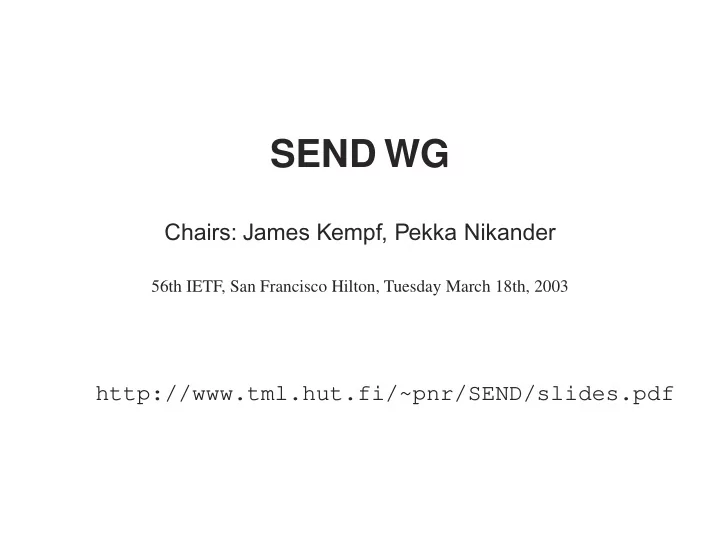

SEND WG Chairs: James Kempf, Pekka Nikander 56th IETF, San Francisco Hilton, Tuesday March 18th, 2003 http://www.tml.hut.fi/~pnr/SEND/slides.pdf
Agenda bashing • 5 min. - Agenda discussion • 10 min. - Last Call Issues for draft-ietf-send-psreq.txt • 10 min. - Self Signed Certificates for CGAs • 20 min. - Open Issues on draft-ietf-send-ipsec-00.txt • 10 min. - Interaction with PANA / DHCP • 5 min. - Draft Status and Schedule • Drafts: • draft-ieft-send-psreq-02.txt (to be submitted) • draft-ietf-send-ipsec-00.txt • draft-aura-cga-00.txt (not a WG item)
draft-ietf-send-psreq.txt • WG Last Call from Jan 23 until Feb 6. • Thanks for everybody who cared to comment! • 26 issues filed in addition to editorial comments http://www.tml.hut.fi/~pnr/SEND/issues.html • 1 issue later to another (#23 to #2) merged • 12 issues resolved by more explanation adding • 1 issue resolved by confusing text removing • 6 issues by adding the suggested text adopted • 4 issues (#2, 9, 21, 24) rejected • More on these on a separate slide • 2 issues (#1 and #11) after discussion resolved • More on these on separate slides
Rejected issues • 2 Clarify the scope of the work • The WG charter is clear enough • Did not contain any concrete proposals • 9 Remove mitigation approaches from 4.3.1 • Based on resolving issue #1; a separate slide later • 21 Add a note about DDNS access controls • Valid comment but out of scope • 24 Replace the current 3 trust scenarios • Rejected after discussion; working group consensus
Issue #11: Using the term "trust" • Draft-01 reads: It should be noted that the term "trust" is used here in a rather non-technical manner. and loose • Issue: The whole point of this document is to define trust models, so very rigid uses of to trust, trusted, and trusting are important. • Further comment: Avoid using the term altogether • Resolution: • Scanned all instances of "trust" etc. • Each instance seemed to be qualified • Removed the words "and loose" from the text above • Personal comment: I am not really happy with this resolution, but IMHO it is probably good enough
Issue #1: Solution suggestions • Draft-01 includes multiple suggestions for possible solutions, with the following disclaimer: • [T]he [solution] discussion is solely for illustrative purposes. It is meant to give the readers a more concrete idea of some possible solutions. It does NOT indicate any preference on solutions on the behalf of the authors or the working group. • Issue: Why there is a need to talk about solutions? • Opinions on the mailing list were mixed: • Some people supported solution examples • Others opposed including them to the text • Currnently there are solution examples, in [[brackets]] • Question: Should the brackets be removed, or the solution examples be removed?
Self signed certificates for CGA • draft-aura-cga-00.txt • A separate set of slides
draft-ietf-send-ipsec-00.txt • A separate set of slides
Interaction with PANA / DCHP • SEND does not deal with access control • PANA is mostly about network access control • SEND only deals with ND, RD, and stateless autoconfig • DHCP deals with stateful (server provided) autoconfig • Usage scenarios • Baseline: Link layer authentication and SEND • SEND and PANA • SEND, PANA, and DHCP
Baseline: Link layer auth and SEND • Client is first authenticated with 802.1x • Once accepted to the network, required to use SEND Client Authenticator Router EAP ID request EAP ID reply EAP TLS request EAP TLS reply EAPOL success DAD NS DAD NS DAD NS RS RA
SEND and PANA • Client gets a link local address with SEND • Using the link local address, it searches for a PAA • PAA performs ND and sends back a reply • Client performs ND and runs PANA with the PAA • PANA creates key material • Also for Client - Router communication • Client authenticates RA with the PANA key material
SEND and PANA Client Router PAA DAD NS DAD NS DAD NS PANA search for a PAA (multicast UDP) NS NA PANA PAA announcement (unicast UDP) NS NA PANA KEYMAT?? RS RA
SEND, PANA and DHCP • Same as SEND and PANA until Router Adverticement • Should PANA create keymat also for DHCP? • Once the client receives RA, it runs DHCP
Client Router PAA DHCP DAD NS DAD NS DAD NS PANA search for a PAA (multicast UDP) NS NA PANA PAA announcement (unicast UDP) NS NA PANA KEYMAT?? KEYMAT?? RS RA NS NA DHCP
Draft status and schedule • draft-ietf-send-psreq-02.txt to the IESG • draft-ietf-send-ipsec-00.txt • Should we split PK AH into a separate draft? • Should we split CGA into a separate draft? • Do we need a CGA-free version? • How to do Proxy ND? • Getting a regression of the protocol against the threats document?
Steps forward • Run the DT for another couple months to resolve the remaining technical issues • Continue talking with IPR holders on CGA to get IPR released specifically for SEND • Generate another draft version (or two) pre-Vienna • Line up a panel of dedicated reviewers (implementors, security Steves, an OPS person) to do a preIESG review • If there are no show-stopper technical issues and CGA IPR gets resolved, submit to IESG post-Vienna
Recommend
More recommend